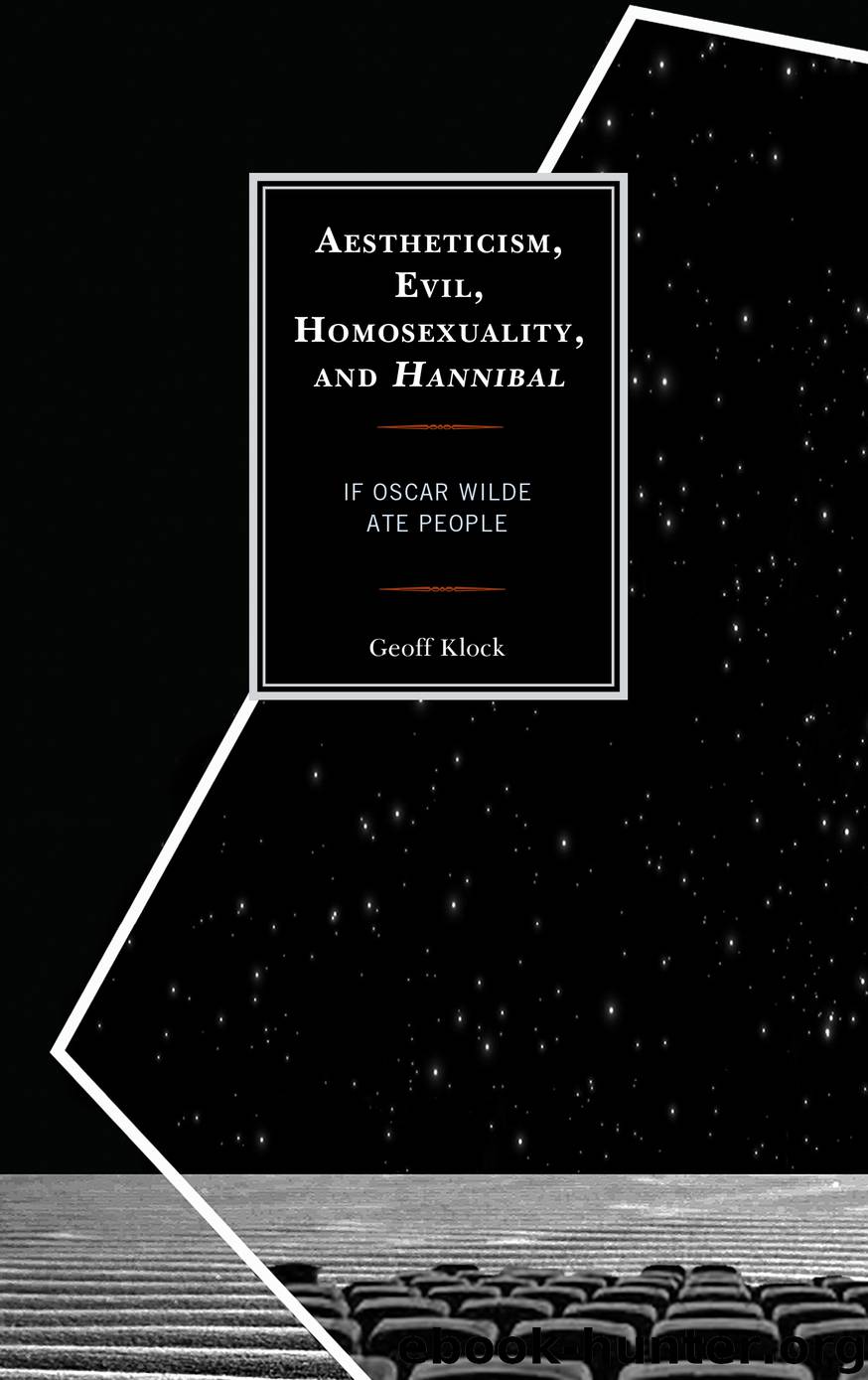Aestheticism, Evil, Homosexuality, and Hannibal by Geoff Klock

Author:Geoff Klock
Language: eng
Format: epub
Publisher: Lexington Books
Conclusion
In the introduction to this book I quoted Walter Pater, who said that all art aspires to the condition of music—to a state of abstraction free of content. This abstraction is often seen in religious terms, as getting close to the invisible, purely spiritual substance of God, and is thus used in churches, as part of service. But as Christian philosopher Søren Kierkegaard points out, Presbyterians “regard the organ as the devil’s bagpipes which lull serious reflection to sleep, just as dance benumbs good intentions.”1 Kierkegaard, a Dane like Mads Mikkelsen, sees music as being the embodiment of sensuality in a complex way: “This is where the significance of music is revealed in its full validity, and in a stricter sense it also reveals itself as a Christian art, or rather, as the art which Christianity posits by shutting it out, as the medium for what Christianity shuts out and thereby posits. In other words, music is the demonic. In the erotic sensual genius, music is its absolute object.”2 Kierkegaard says later “music always expresses the immediate in its immediacy . . . in language there is reflection and therefore language cannot express the immediate,”3 the immediate of sensual satisfaction that so entrances the hedonist, the pleasure seeker, the libertine. We think of the kind of music that Hannibal listens to as higher and more refined, but it is a higher and more refined form of pleasure—just as his meals are; Hannibal always pairs good music with scenes of Hannibal cooking. As music is the emblem of what is important in art, it may show that all art is quite dangerous, demonic even.
Montaigne, in his 1580 essay “On Cannibals” describes inhabitants of the new world eating each other not for nourishment, but “to symbolize ultimate revenge”;4 the most famous skeptic in the world, he compares the practice of these so-called “barbarians” to the torture his own countrymen engage in and finds Europe wanting: at least the newly discovered tribes kill their victims first, rather than make them suffer. This kind of skepticism is not what Hannibal is engaging in. Whatever else Hannibal is he is a defender of value. I have already shown how Hannibal fully incarnates the classic humanities trope of “gather ye rosebuds while ye may.” He also defends the existence of God, and not just to initiate Will into Gnosticism: Hannibal asks the Mural Killer “When your great eye looked to the heavens, what did it see?”
Grey: Nothing.
Hannibal: Not anymore.
Grey: There is no God.
Hannibal: Certainly not with that attitude. God gave you purpose, not only to create art, but to become it. (2.2)
Consider this exchange with Will’s neurologist, on the topic of Iberico ham. Hannibal says “is the pig, once fattened and slaughtered and air-cured really superior to any other pig? Or is it simply a matter of reputation preceding product” and the doctor replies flippantly “it’s irrelevant. If the meat eater believes it’s superior then belief determines value” (1.10). We have an idea that atheists and
Download
This site does not store any files on its server. We only index and link to content provided by other sites. Please contact the content providers to delete copyright contents if any and email us, we'll remove relevant links or contents immediately.
| Ancient & Classical | Arthurian Romance |
| Beat Generation | Feminist |
| Gothic & Romantic | LGBT |
| Medieval | Modern |
| Modernism | Postmodernism |
| Renaissance | Shakespeare |
| Surrealism | Victorian |
4 3 2 1: A Novel by Paul Auster(12368)
The handmaid's tale by Margaret Atwood(7752)
Giovanni's Room by James Baldwin(7320)
Asking the Right Questions: A Guide to Critical Thinking by M. Neil Browne & Stuart M. Keeley(5755)
Big Magic: Creative Living Beyond Fear by Elizabeth Gilbert(5753)
Ego Is the Enemy by Ryan Holiday(5412)
The Body: A Guide for Occupants by Bill Bryson(5077)
On Writing A Memoir of the Craft by Stephen King(4925)
Ken Follett - World without end by Ken Follett(4720)
Adulting by Kelly Williams Brown(4564)
Bluets by Maggie Nelson(4544)
Eat That Frog! by Brian Tracy(4519)
Guilty Pleasures by Laurell K Hamilton(4438)
The Poetry of Pablo Neruda by Pablo Neruda(4092)
Alive: The Story of the Andes Survivors by Piers Paul Read(4017)
White Noise - A Novel by Don DeLillo(4001)
Fingerprints of the Gods by Graham Hancock(3986)
The Book of Joy by Dalai Lama(3971)
The Bookshop by Penelope Fitzgerald(3843)
